|
|
 |
 |
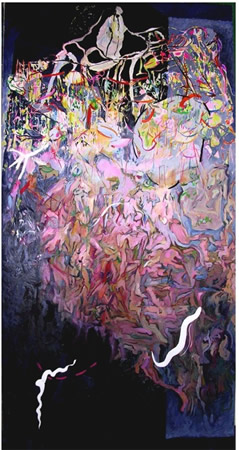 "Rebirth"
oil 42" 84" 1973
"Rebirth"
oil 42" 84" 1973 |
Rebirth
Flesh
hung like grapes, ovum, small fishes
Yet undifferentiated, insentient, uncreated.
Tissue from muscle, strident or limp
and heaped incomplete
supports rock and sunset.
Satin sandwater light
on gossamer weave, glow
rising and dangling, dancing
in night breeze desire.
High above ghost scarf reins flashlight and hula hoop
spins web out
of mystery cloth backed and impossible structure,
holds music and silence
and all the while swimming
spermish white final
repeating
around. |
"Rebirth"
(1971), also large does not compress but becomes an obstacle,
a person sized obstacle, a "something"...and that
something is the door of samsara or cyclic existence. "Rebirth"
is about reincarnation and a time before birth. It is complete
with ovum and sperm but includes lively ghosts, sunset beach
light, architectural forms and geometric shapes. In "Triptych"-1972
(three much smaller works) the scene first is a ghost hanging
in an architectural space caught in a wobbly infinity sign from
which hang and dangle suggestive shapes, forms and colors. At
least one independent wormy sperm shape adheres to the jumble.
In the second, a shadow appears on one wall and the whole form
has a (tree) trunk stabilizing the mass. By the third, the ghost
still remains and shafts of light illuminate the expanding forms.
The sperm has attracted a female shape with three party hats.
|
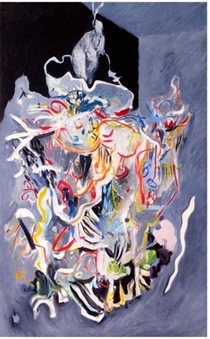 "Triptic
I" oil 1972 20" x 32"
"Triptic
I" oil 1972 20" x 32"
|
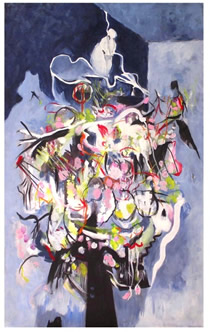
"Triptic II" oil 1972 20" x 32"
|
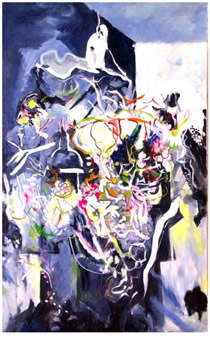 "Triptic
III" oil 1972 20" x 32"
"Triptic
III" oil 1972 20" x 32" |
"Triptic" Sold As a Set of Three |
| Triptic
Ghost or Spirit, inside forms
contracted once and then let loose
straightened up, more shepherd-like
space bloomed in subtle tone.
and a shape appeared with three party hats;
a scarecrow, a sperm, a flying lamb
Light from wind bells, moon and shore, flowers, clouds, seashell,
twigs,
contracted once and then let loose
but not the thread within
the thread within
our inside outside greenhouse.
|
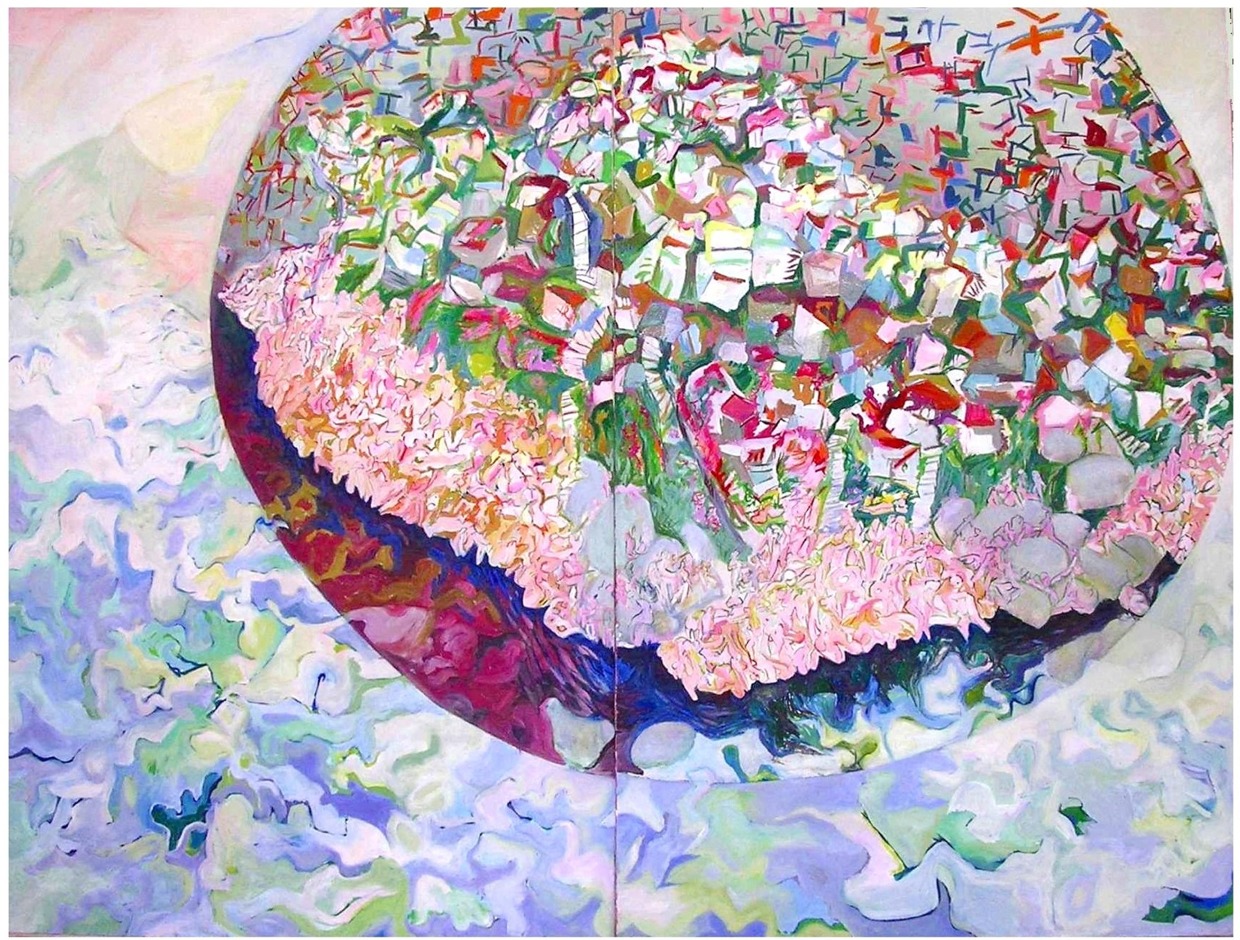 "Ditherambic
Perimeter" oil 1972 78" x 91"
"Ditherambic
Perimeter" oil 1972 78" x 91"
|
| Ditherambic
Perimeter
I took the alleys, back streets, myriad walkways, stairs
Leading on to a less, or, more provocative version
Of what had gone before including little details.
There were gates and fences, gardens, dwellings
Squeezed over and under and beside one another
All covered with strange tropical growth.Large, brilliant,
Languid and rubbery. Flowers, succulents, trees, even
People, buildings and animals--they were all the same
beaches itched with sand inside bathing suit thighs hair
limbs heated by sun glare and nylon and salt burn smoothies
hung over health food hazard squashed on the boardwalk which
teamed and crawled unwholesome greased window innocence abuse
finger fairy craven hunger shut open intermingling youth spent
juicy ne-
glect intellectual sham faced doggy scooper lava under eye socket
de-
pression where clean skin smells sour, diet of cracker and chain
mail
religion wheat germ bought gigolo renter bail bondsman phonies
real estate belly slime Everywhere, there was nowhere to look...so
I looked drank it in choked on it I tripped over and laid down.
It
rolled over me like a steam roller putrid fetch lobster cage
man-
drill like night orgy sleep anxiously watching stone wheel bird
wave after wave slapped up against young body bubble chill
even air clattered furniture cooking pots clothing lost dreams
stray smells and thought baggage orchid lonely greenhouse
basement absence cliff lovers rubbish, tarnish and spent.
All resonating, spinning without axis nor restraint and pleasure
Gone by, so long ago I survived this bell jar fish float because
Angel thumb ocean desired it and tidewater grace.
|
"Dithyrambic
Perimeter" (1972) is a mandala about life in samsara but
it is seen from a western point of view. It is a mandala in that
it is round, independent like the moon, and represents a "whole"
world, and, an effort to reunify the self. An Eastern Mandala
is meant to establish order, while a Western mandala serves to
break up stasis. The Dithyramb was a Greek theatrical production
where the actors represented Gods but they acted out all the flaws
and sufferings of mere mortals. The audience would be completely
taken up with the dramas and would have great catharsis of their
own in parallel with the plays. In Eastern thought a Mandala or
a prayer wheel is about the Gods or Buddhas or other Celestial
beings, and its 'use' demonstrates the turning of dharma. Usually
a concentric organization of geometric shapes somewhat symmetrical,
Eastern mandalas are often destroyed in ceremonies. They are made
as offerings, invocations to the Buddha to produce dharma. Here
however, the mandala is not about Buddhas or divine beings, nor
is it symmetrical or made of geometric shapes, but, it is about
being in samsara, the world of myriad forms, and the phenomenal.
The 'beings' here are without completion, individuality (Buddhahood),
while maintaining their sentience (potential for feeling). The
houses and gardens too are rambling and only suggestive, the sky
is filled with human things floating upward, the sea itself meets
only with more sea at its circumference. Two rocks are poised
along the circumference and the orb is pierced in one place by
an object which could be a duck or a sperm. To the left one 'eggy'
shaped flesh-form is rolling down between two rocks. This "mandala"
is about samsara. "The absolute within the relative is the
mirror awareness which is revealed by cleaning and polishing the
mind by cessation and emptiness; at this point, the focus of concentration
can make anything fill the universe, or make the universe into
one point of awareness. Relative and absolute depend on each other,
so two elements make three, adding their intermingling, the source
of the two."
This mandala is about the breaking up of paralysis. Rather Hegalian
in principal. The artist becoming one with samsara, chokes on
it until the images are finally extruded in a resolved form. "The
absolute is always being expressed in the relative - this is the
true absolute, but it is not always seen." Its sort of; suffering
in, but Form out. This formula however works only after the artist
has made his person truly dependent, natural, (or an experiment)
and has acquired sufficient accuracy, endurance and focus. In
"Dithyrambic Perimeter" we see the samsaric side (the
relative) but it is already made into Form. To most observers
it is a positive, even happy painting, even when the observer
reads the poem, which explains this samsara painting. This is
not surprising since an artist's work though related to his life
can also be a contradiction of that life as well. The "content"
of this painting began with recollections of life in Laguna Beach
(1971) and much mental torment.
|
 |
 |
|